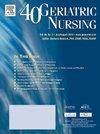跌倒疗效量表 - 正式护理人员:葡萄牙疗养院的适应性和验证。
IF 2.5
3区 医学
Q3 GERIATRICS & GERONTOLOGY
引用次数: 0
摘要
文献综述显示,跌倒恐惧不仅存在于老年人身上,也存在于他们的职业生涯中,并影响着他们日常生活活动的表现。本方法研究的目的是改编和验证跌倒效能量表-正式护理人员。所研究的量表是在跌倒效能量表--国际版的基础上开发的,该量表是为评估正式护理人员的跌倒恐惧而改编的。居住在葡萄牙 11 家养老院的 319 名老年人正式护理人员填写了问卷。他们的平均年龄为(46.8 ± 10.7)岁,从事这一工作的时间为(13.4 ± 8.2)年,其中 67.7% 的人在受雇于养老院后参加了工作场所的职业培训。正式护理人员跌倒效能量表》包含 16 个项目,显示出良好的内部一致性(α = 0.848)。经过探索性因子分析和确认性因子分析,这些项目被归纳为 3 个因子(较小体力活动;中等体力活动,在安全条件下进行;中等体力活动,在不太安全的条件下进行),具有充分的收敛效度。本文章由计算机程序翻译,如有差异,请以英文原文为准。
Falls efficacy scale – Formal caregivers: Adaptation and validation in Portuguese nursing homes
The literature review shows that the fear of falling is present in older persons’, but also in their careers and influences the performance of activities of daily living. The objective of this methodological study was to adapt and validate the Falls Efficacy Scale – Formal Caregivers. The development of the examined scale was based on the Falls Efficacy Scale – International, which was adapted for assessing the fear of falling in formal caregivers. The instrument was filled out by 319 formal caregivers of older people living in 11 Portuguese nursing homes for older people. Their average age was 46.8 ± 10.7 years, they had been working in this role for 13.4 ± 8.2 years, and 67.7 % of them attended vocational training in the workplace after being employed at the nursing home. Falls Efficacy Scale – Formal Caregivers, which contains 16 items, showed good internal consistency (α = 0.848). These items were organized into 3 factors after exploratory and confirmatory factor analysis (lesser physical effort activities; intermediate physical effort activities, carried out in safe conditions; and intermediate physical effort activities, carried out in less safe conditions), with adequate convergent validity.
求助全文
通过发布文献求助,成功后即可免费获取论文全文。
去求助
来源期刊

Geriatric Nursing
医学-护理
CiteScore
3.80
自引率
7.40%
发文量
257
审稿时长
>12 weeks
期刊介绍:
Geriatric Nursing is a comprehensive source for clinical information and management advice relating to the care of older adults. The journal''s peer-reviewed articles report the latest developments in the management of acute and chronic disorders and provide practical advice on care of older adults across the long term continuum. Geriatric Nursing addresses current issues related to drugs, advance directives, staff development and management, legal issues, client and caregiver education, infection control, and other topics. The journal is written specifically for nurses and nurse practitioners who work with older adults in any care setting.
 求助内容:
求助内容: 应助结果提醒方式:
应助结果提醒方式:


